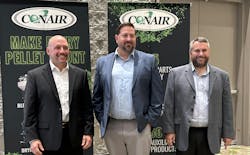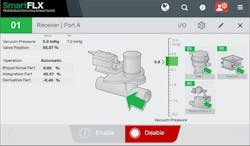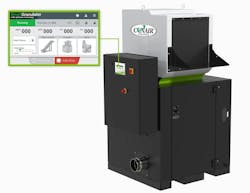Conair emphasizes service, advanced technology
By Lynne Sherwin
Plastics processors need all the assistance they can get as they manage labor shortages, cost pressures and increasingly complex equipment. Conair wants to get the message across: We are here to help.
“Everything that's new is really being driven from the voice of the customer. What are we hearing from the customer? What are we hearing through our reps? And what problems are they having that we're solving?” said Stephen Szakelyhidi, director of marketing, at the company’s NPE2024 press conference.
That feedback has driven recent innovations from the auxiliary equipment maker. The ongoing shortage of skilled labor has created pressures for processors in multiple areas that Conair is aiming to address with both technology (such as its common control, equipment monitoring and artificial intelligence, or AI) and personnel (such as service and engineering support).
“Customers have grown to expect that they will get well-engineered, reliable auxiliaries,” company President Jason Ganim said in an interview for the PMM Insight podcast. “What they're looking for now is more of a collaborative relationship with a partner that can deliver an auxiliary equipment solution that can make them more successful, often by providing more expertise and support throughout the lifecycle of that equipment.”
He said the company is aiming to strengthen its relationship with processors in multiple ways.
One major area of focus is customer care. At the show, Conair announced two new support options: machine health assessments (MHAs) and customized service agreements.
An MHA is a facility visit to evaluate the performance and status of auxiliary equipment, resulting in a detailed report of equipment condition and any repair or ongoing maintenance needs. Service agreements go a step further, bundling scheduled on-site visits, MHAs, in-person or virtual training, access to maintenance and replacement parts, and other services ranging from quarterly to once or twice per year or more, depending on the customer’s needs.
Just three months after NPE, demand for these services was already high, according to Gio Moya, business development manager for Conair. Since the show, Moya had visited more than 60 processors and said a significant number had already scheduled MHAs and training, or signed service agreements. Others are in the consideration phase.
Moya said a typical conversation begins with a few questions: “‘What’s going on in your business? Are you having any issues? What is your staffing like? Are you interested in an assessment of the status of your equipment?’”
In other cases, processors take the lead, asking simply, “Can you take a look at my equipment and see what I need to fix?”
“Many struggle with maintenance staffing, since maintenance personnel tend to be generalists with broad responsibilities for plantwide systems — air conditioning, plumbing, electricity — and limited expertise with auxiliary equipment. They have the skills to work with auxiliaries and controls, but need guidance when it comes to the specifics of blenders, dryers, heat transfer or conveying equipment,” Moya said. “In many cases, we can provide that over the phone, but it can be frustrating because the breakdown has already happened and they’re working under a lot of pressure.”
He said onsite training for maintenance personnel is often combined with an MHA.
The company is testing a service agreement in which customers use SmartServices, its Industry 4.0 monitoring and management system for auxiliary equipment, to share data and performance alerts with Conair’s techs to ensure a faster response.
Moya said while processors might have once thought such monitoring to be intrusive and unwelcome, they are now realizing the benefits of a proactive approach and timely cooperation to avoid downtime or emergency onsite repairs.
Another step in improving relationships was splitting the company into a “units” business for ordering and receiving equipment, and a “solutions-focused” business to engineer specialized equipment solutions for customers who need them, “everything from small systems and process lines to complete production plants,” Ganim said.
The units business has combined “two sides of a coin,” Szakelyhidi said — the team sizing and quoting the system, and the one managing the engineering and installation.
“Those teams are now collaborating better to make sure that in many cases, we have our engineers talking to the processing engineers at the plant to make sure we're dialing in exactly what we need. ... We catch things earlier by getting both teams involved and making sure we're asking all the questions up front,” he said.
Finally, Conair is implementing more advanced technology into its lines. A dozen new offerings were among the 55 pieces of equipment on display at NPE, many of which incorporated Industry 4.0 elements, including machine data monitoring and even AI.
Sam Rajkovich, VP of sales and marketing, said at the show Conair defines AI as “the combination of operational experience and live data and processing power, culminating in the ability to automate complex mechanical changes without human intervention ... taking what used to be human knowledge and brain power, and turning that into computer knowledge.”
He said the company is leveraging AI to train equipment to continually optimize the process and manage more complexity, which eliminates errors, improves process stability and frees up operators to “put their expertise into making parts.”
The new Conveying with Optimizer system, one of two AI-powered innovations the company launched at NPE, collects data from input commands and the SmartFLX control package, and applies AI to autonomously make adjustments for bulk density, vacuum leaks, blockages and conveying distance.
ResinWorks with Optimizer also employs AI. The centralized multi-hopper drying system automates the process of maintaining process-ready resins at perfect temperatures, and is retrofittable with a hardware and software upgrade.
When processors order a drying system, they specify the maximum throughput they expect to need, and the blowers are fixed at, for example, 200 pounds an hour. “And you're always using energy for 200 pounds an hour,” Rajkovich said.
“With ResinWorks with Optimizer, we have a servo control damper, and it reads how much of your throughput is actually being processed. And it'll back down the airflow and save energy based on what you're running,” he said. “It adapts to mass flow and throughput changes, it’s highly reliable, and you can get energy savings that we've seen from 10 to 40 percent.”
“The problem we're trying to solve is normally with a granulator, by the time you have a problem, it's too late,” Rajkovich said. “So we have logic and sensors built into the equipment, so we can capture things like blade dullness or sharpness, and determine when it's time to sharpen your blades before you have a gaylord full of dust."
Unlike the Optimizer-enabled equipment, the SG2 control doesn’t utilize AI.
“We see a smart control as one that captures key data and uses it to inform the operator of changes that could affect equipment operation in time for the operator to make decisions. So it's unlike an AI-driven control which can make equipment changes autonomously,” Ganim said.
Conair’s common control system is another advancement aimed at helping overcome the skills gap. It provides a consistent interface across all the company’s auxiliary lines that makes onboarding easier and improves operating efficiency. Szakelyhidi compared it to Apple’s interface that allows an iPhone user to move easily to an iPad or an Apple Watch.
Are processors embracing advanced technologies? It’s early, but Conair’s leaders think as companies learn what AI and Industry 4.0 can do, the benefits will become clear.
“This is still new, but we believe that when processors look at the savings in costs and increased performance, they'll become more accepting,” Ganim said.
While large processors might be first in line so they can realize big savings, Szakelyhidi said a smaller company facing personnel challenges “may benefit more than someone else ... that's three times their size.”
Contact:
Conair Group, Cranberry Township, Pa., 724-584-5500, www.conairgroup.com
About the Author
Lynne Sherwin
Managing Editor
Managing editor Lynne Sherwin handles day-to-day operations and coordinates production of Plastics Machinery & Manufacturing’s print magazine, website and social media presence, as well as Plastics Recycling and The Journal of Blow Molding. She also writes features, including the annual machinery buying survey. She has more than 30 years of experience in daily and magazine journalism.



